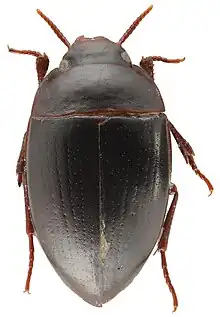| Aspidytidae | |
|---|---|
 | |
| Sinaspidytes wrasei | |
| Scientific classification | |
| Domain: | Eukaryota |
| Kingdom: | Animalia |
| Phylum: | Arthropoda |
| Class: | Insecta |
| Order: | Coleoptera |
| Suborder: | Adephaga |
| Family: | Aspidytidae Ribera, Beutel, Balke and Vogler, 2002 |
| Genera[1] | |
| |
Aspidytidae is a family of aquatic beetles of the suborder Adephaga, described in 2002 from specimens in South Africa and China.[2] There are only two known species in the family and these were originally described in the genus Aspidytes,[2][3] but later the new genus Sinaspidytes was erected for the species found in China.[4] The family can also be referred to by its trivial name cliff water beetles. [5]
Description
Cliff water beetles have a streamlined body that is dorsally convex. Their size ranges from 4.8 - 7.0 mm in length. Dorsal side is predominantly black and cuticle is shiny.[3] The head is laterally rounded and shortened with the compound eyes integrated in the outline. Legs lack swimming hairs.[2]
Known species of Aspidytidae
Aspidytes niobe - known from South Africa. Body length 6.5 - 7.2 mm [2]
Sinaspidytes wrasei - has only been found at one location in the Shaanxi province, China. Body length 4.8 – 5.2 mm. [6]
Biology and ecology
Larvae and adults of both A. niobe and S. wrasei are found in or in close proximity of hygropetric habitats[3] - meaning they require a rock surface covered by a thin layer of water. Both adults and larvae are likely predacious. Eggs and pupa are yet unknown.[3]
Phylogeny and evolution
The phylogenetic placement of Aspidytidae within the superfamily Dytiscoidea is still under debate, and even whether the family is monophyletic or paraphyletic with respect to Amphizoidae.
Initially both species were categorized in the same genus – Aspidytes. Later Sinaspidytes was erected for S. wrasei following a phylogenetic analysis using 11 genes that recovered Aspidytidae as praphyletic. [4]
| ||||||||||||||||||||||||||||||||||
Later studies using genomic data have been inconclusive. A study using ultraconserved elements (UCE) still recovered Aspidytidae as paraphyletic, but with a different arrangement between the two species and Amphizoidae. [7]
| ||||||||||||||||||||||||||||||||||
However, two of the latest studies using genomic data do recover a monophyletic Aspidytidae. [8] [9]
| |||||||||||||||||||
References
- ↑ "Aspidytidae". National Center for Biotechnology Information (NCBI). Retrieved 14 January 2021.
- 1 2 3 4 Ribera, I.; Beutel, R.G.; Balke, M.; Vogler, A.P. (2002). "Discovery of Aspidytidae, a new family of aquatic Coleoptera". Proceedings of the Royal Society of London. 269 (1507): 2351–2356. doi:10.1098/rspb.2002.2157. PMC 1691161. PMID 12495503.
- 1 2 3 4 Beutel, R.G., Balke, M. & Ribera, I. (2016) 7.7. Aspidytidae Ribera,Beutel, Balke and Vogler, 2002. In: Beutel, R.G. & Leschen, R.A.B. (eds.): "Handbook of Zoology, Arthropoda: Insecta. Coleoptera, Beetles. Vol. 1: Morphology and Systematics" (Archostemata, Adephaga, Myxophaga, Polyphaga partim). 2nd Edition. Walter de Gruyter, Berlin. pp. 141-149.
- 1 2 Toussaint, Emmanuel F. A.; Beutel, Rolf G.; Morinière, Jérôme; Jia, Fenglong; Xu, Shengquan; Michat, Mariano C.; Zhou, Xin; Bilton, David T.; Ribera, Ignacio; Hájek, Jiří; Balke, Michael (2016). "Molecular phylogeny of the highly disjunct cliff water beetles from South Africa and China (Coleoptera: Aspidytidae)". Zoological Journal of the Linnean Society. 176 (3): 537–546. doi:10.1111/zoj.12332. hdl:11336/60381.
- ↑ Nilsson, Anders N.; van Vondel, Bernhard J. (2005-01-01). Amphizoidae, Aspidytidae, Haliplidae, Noteridae and Paelobiidae (Coleoptera, Adephaga). BRILL. doi:10.1163/9789004473393. ISBN 978-90-04-47339-3.
- ↑ Balke, M., Ribera, I. & Beutel, R. G. 2002 "Aspidytidae: on the discovery of a new family of beetles and a key to fossil and extant adephagan families." In Water beetles of China, vol. 3 (ed. M. A. Jäch & L. Ji). Vienna: Zoologisch-Botanische Gesellschaft in O ¨ sterreich and Wiener Coleopterologenverein (In the press.)
- ↑ Baca, Stephen M.; Gustafson, Grey T.; Alexander, Alana M.; Gough, Harlan M.; Toussaint, Emmanuel F. A. (2021). "Integrative phylogenomics reveals a Permian origin of Adephaga beetles". Systematic Entomology. 46 (4): 968–990. doi:10.1111/syen.12506. ISSN 0307-6970. S2CID 237486703.
- ↑ Vasilikopoulos, Alexandros; Balke, Michael; Beutel, Rolf G.; Donath, Alexander; Podsiadlowski, Lars; Pflug, James M.; Waterhouse, Robert M.; Meusemann, Karen; Peters, Ralph S.; Escalona, Hermes E.; Mayer, Christoph (2019). "Phylogenomics of the superfamily Dytiscoidea (Coleoptera: Adephaga) with an evaluation of phylogenetic conflict and systematic error". Molecular Phylogenetics and Evolution. 135: 270–285. doi:10.1016/j.ympev.2019.02.022. PMID 30822528. S2CID 73488914.
- ↑ Vasilikopoulos, Alexandros; Balke, Michael; Kukowka, Sandra; Pflug, James M.; Martin, Sebastian; Meusemann, Karen; Hendrich, Lars; Mayer, Christoph; Maddison, David R.; Niehuis, Oliver; Beutel, Rolf G. (2021). "Phylogenomic analyses clarify the pattern of evolution of Adephaga (Coleoptera) and highlight phylogenetic artefacts due to model misspecification and excessive data trimming". Systematic Entomology. 46 (4): 991–1018. doi:10.1111/syen.12508. ISSN 0307-6970.